#fiberglass animal structures
Explore tagged Tumblr posts
Text
Our experienced team of painters then apply the primer after the cleaning process. Applying primer ensures the longevity of the colours on the sculptures. Big fiberglass animal structures are normally placed on garden decoration, so putting a primer before putting on any colour is a must step. Also using a primer protects the fiberglass animal statues from corrosion, rust from any kind of weather condition.
0 notes
Text
Crystal Palace Field Trip Part 2: Walking With Victorian Dinosaurs
[Previously: the Permian and the Triassic]
The next part of the Crystal Palace Dinosaur trail depicts the Jurassic and Cretaceous periods. Most of the featured animals here are actually marine reptiles, but a few dinosaur species do make an appearance towards the end of this section.
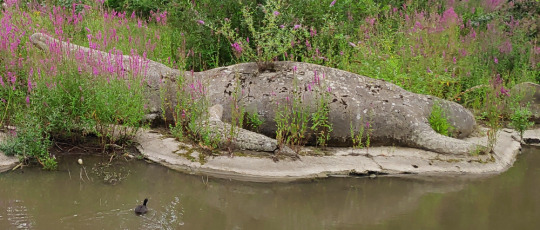
Although there are supposed to be three Jurassic ichthyosaur statues here, only the big Temnodontosaurus platyodon could really be seen at the time of my visit. The two smaller Ichthyosaurus communis and Leptonectes tenuirostris were almost entirely hidden by the dense plant growth on the island.

Ichthyosaurs when fully visible vs currently obscured Left side image by Nick Richards (CC BY SA 2.0)
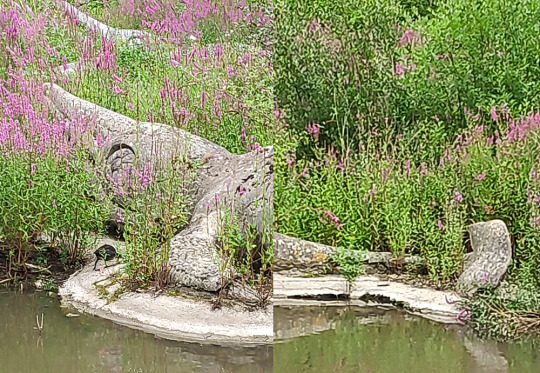
Head, flipper, and tail details of the Temnodontosaurus. A second ichthyosaur is just barely visible in the background.
Ichthyosaurs were already known from some very complete and well-preserved fossils in the 1850s, so a lot of the anatomy here still holds up fairly well even 170 years later. They even have an attempt at a tail fin despite no impressions of such a structure having been discovered yet! Some details are still noticeably wrong compared to modern knowledge, though, such as the unusual amount of shrinkwrapping on the sclerotic rings of the eyes and the bones of the flippers.

———

Arranged around the ichthyosaur, three different Jurassic plesiosaurs are also represented – “Plesiosaurus” macrocephalus with the especially sinuous neck on the left, Plesiosaurus dolichodeirus in the middle, and Thalassiodracon hawkinsi on the right.
They're all depicted here as amphibious and rather seal-like, hauling out onto the shore in the same manner as the ichthyosaurs. While good efforts for the time, we now know these animals were actually fully aquatic, that they had a lot more soft tissue bulking out their bodies, and that their necks were much less flexible.

———
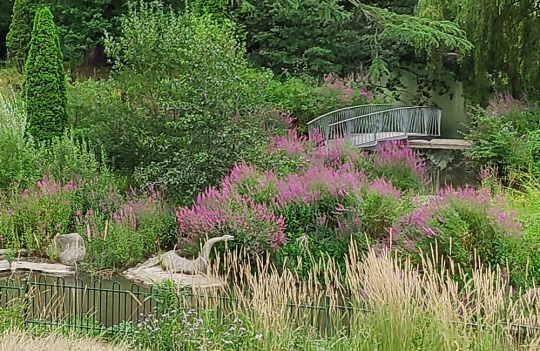
The recently-installed new pivot bridge is also visible here behind some of the marine reptiles.
———
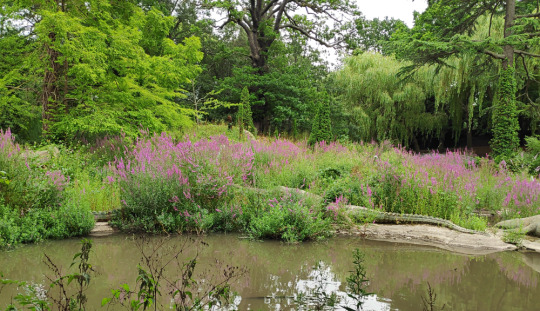
Positioned to the left of the other marine reptiles, this partly-obscured pair of croc-like animals are teleosaurs (Teleosaurus cadomensis), a group of Jurassic semi-aquatic marine crocodylomorphs.

A better view of the two teleosaurs by MrsEllacott (CC BY-SA 4.0)
The Crystal Palace statues have the general proportions right, with long thin gharial-like snouts and fairly small limbs. But some things like the shape of the back of the head and the pattern of armored scutes are wrong, which is odd considering that those details were already well-known in the 1850s.

———

Finally we reach the first actual dinosaur, and one of the most iconic statues in the park: the Jurassic Megalosaurus!
Megalosaurus bucklandi was the very first non-avian dinosaur known to science, discovered in the 1820s almost twenty years before the term "dinosaur" was even coined.
At a time when only fragments of the full skeleton were known, and before any evidence of bipedalism had been found, the Crystal Palace rendition of Megalosaurus is a bulky quadrupedal reptile with a humped back and upright bear-like limbs. It's a surprisingly progressive interpretation for the period, giving the impression of an active mammal-like predator.
This statue suffered extensive damage to its snout in 2020, which was repaired a year later with a fiberglass "prosthesis".

———

Reaching the Cretaceous period now, we find Hylaeosaurus (and one of the upcoming Iguanodon peeking in from the side).
Hylaeosaurus armatus was the first known ankylosaur, although much like the other dinosaurs here its life appearance was very poorly understood in the early days of paleontology. Considering how weird ankylosaurs would later turn out to be, the Crystal Palace depiction is a pretty good guess, showing a large heavy iguana-like quadruped with hoof-like claws and armored spiky scaly skin.
It's positioned facing away from viewers, so its face isn't very visible – but due to the head needing to be replaced with a fiberglass replica some years ago, the original can now be seen (and touched!) up close near the start of the trail.


———

Two pterosaurs (or "pterodactyles" according to the park signs) were also supposed to be just beyond the Hylaeosaurus, but plant growth had completely blocked any view of them.
Although these two statues are supposed to represent a Cretaceous species now known as Cimoliopterus cuvieri, they were probably actually modeled based on the much better known Jurassic-aged Pterodactylus antiquus.
A second set of pterosaur sculptures once stood near the teleosaurs, also based on Pterodactylus but supposed to represent a Jurassic species now known as Dolicorhamphus bucklandii. These statues went missing in the 1930s, and were eventually replaced with new fiberglass replicas in the early 2000s… only to be destroyed by vandalism just a few years later.
(The surviving pair near the Hylaeosaurus are apparently in a bit of disrepair these days, too, with the right one currently missing most of its jaws.)
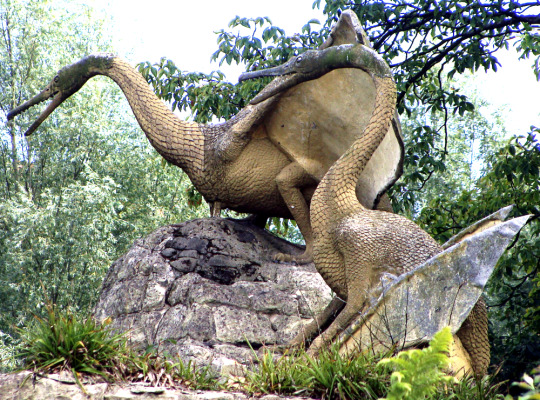
Image by Ben Sutherland (CC BY 2.0)
The Crystal Palace pterosaurs weren't especially accurate even for the time, with heads much too small, swan-like necks, and bird-like wings that don't attach the membranes to the hindlimbs. Hair-like fuzz had been observed in pterosaur fossils in the 1830s, but these depictions are covered in large overlapping diamond-shaped scales due to Richard Owen's opinion that they should be scaly because they were reptiles.
But some details still hold up – the individual with folded wings is in a quadrupedal pose quite similar to modern interpretations, and the bird-like features give an overall impression of something more active and alert than the later barely-able-to-fly sluggish reptilian pterosaur depictions that would become common by the mid-20th century.

(Much like the statues themselves, the "modern" reconstruction above is based on Pterodactylus rather than Cimoliopterus)
———

The last actual dinosaurs on this dinosaur trail are the two Cretaceous Iguanodon sculptures. At the time of my visit they weren't easy to make out behind the overgrown trees, and only the back end of the standing individual was clearly visible.

Named only a year after Megalosaurus, Iguanodon was the second dinosaur ever discovered, and early reconstructions depicted it as a giant iguana-like lizard.
The Crystal Palace statues depict large bulky animals, one in an upright mammal-like stance and another reclining with one hand raised up. (This hand is usually resting on a cycad trunk, but that element appeared to be either missing or fallen over when I was there.)
Famously a New Year's dinner party was held in the body of the standing Iguanodon during its construction, although the accounts of how many people could actually fit inside it at once are probably slightly exaggerated.

A clearer view by Jim Linwood (CC BY 2.0)
Considering that the skull of Iguanodon wasn't actually known at the time of these sculpture's creation, the head shape with a beak at the front of the jaws is actually an excellent guess. The only major issue was the nose horn, which was an understandable mistake when something as strange as a giant thumb spike had never been seen in any known animal before.

(The fossils the Crystal Palace statues are based on are actually now classified as Mantellisaurus atherfieldensis, but the "modern" reconstruction above depicts the chunkier Iguanodon bernissartensis.)
———
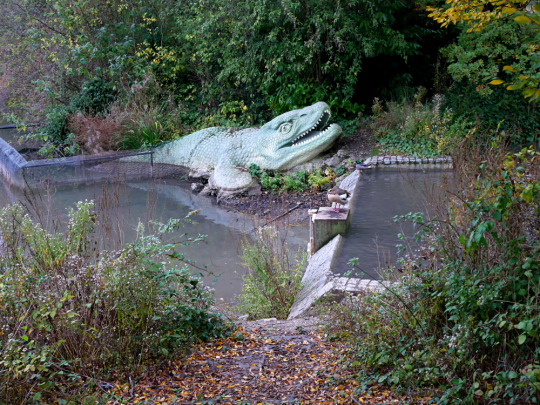
Image by Doyle of London (CC BY-SA 4.0)
I also wasn't able to spot the Cretaceous mosasaur on the other side of the island due to heavy foliage obscuring the view.
Depicting Mosasaurus hoffmannii, this model consists of only the front half of the animal lurking at the water's edge. It's unclear whether this partial reconstruction is due to uncertainty about the full appearance, or just a result of money and time running out during its creation.
The head is boxier than modern depictions, and the scales are too large, but the monitor-lizard like features and paddle-shaped flippers are still pretty close to our current understanding of these marine reptiles. It even apparently has the correct palatal teeth!

Next time: the final Cenozoic section!
#field trip!#crystal palace dinosaurs#retrosaurs#i love them your honor#crystal palace park#crystal palace#ichthyosaur#plesiosaur#teleosaurus#crocodylomorpha#marine reptile#megalosaurus#theropod#hylaeosaurus#ankylosaur#iguanodon#ornithopoda#ornithischia#dinosaur#pterodactyle#pterodactylus#pterosaur#mosasaurus#mosasaur#paleontology#vintage paleoart#art
467 notes
·
View notes
Text
14 species to look at (i worked hard)
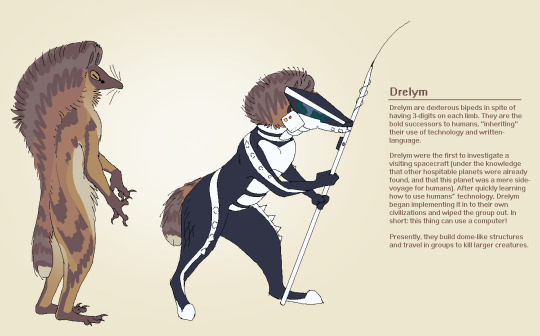
Drelym
Drelym are dexterous bipeds in spite of having 3-digits on each limb. They are the bold successors to humans, "inheriting" their use of technology and written-language.
Drelym were the first to investigate a visiting spacecraft (under the knowledge that other hospitable planets were already found, and that this planet was a mere side-voyage for humans). After quickly learning how to use humans’ technology, Drelym began implementing it in to their own civilizations and wiped the group out. In short: this thing can use a computer!
Presently, they build dome-like structures and travel in groups to kill larger creatures.
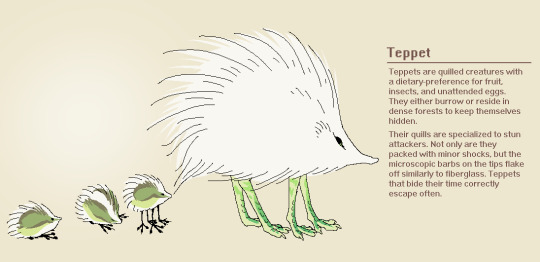
Teppet
Teppets are quilled creatures with a dietary-preference for fruit, insects, and unattended eggs. They either burrow or reside in dense forests to keep themselves hidden.
Their quills are specialized to stun attackers. Not only are they packed with minor shocks, but the microscopic barbs on the tips flake off similarly to fiberglass. Teppets that bide their time correctly escape often.

Tervine
Tervines are massive, disc-shaped, grazing animals that roam in the open. The rocky masses on their backs are both crucial to their protection as well as natural. Plant growth and rock formations can indicate age.
Their offspring retract in to their “shells” to appear like rocks, and they often hitch rides on their mothers’ backs. In more pressing situations, their mothers even allow them to hide beneath them.
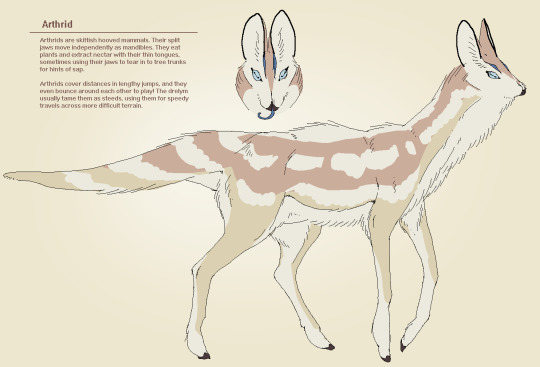
Arthrid
Arthrids are skittish hooved mammals. Their split jaws move independently as mandibles. They eat plants and extract nectar with their thin tongues, sometimes using their jaws to tear in to tree trunks for hints of sap.
Arthrids cover distances in lengthy jumps, and they even bounce around each other to play! The drelym usually tame them as steeds, using them for speedy travels across more difficult terrain.

Baleon
As some of the most common predators, baleons are dreaded for their lengthy claws. Baleons tolerate each other in unorganized social groups, but they remain alone when raising offspring.
Their body variations are hereditary, but traits of them can combine. “Masked” baleons have thick, dulled claws and a hard facial surface. “Bald” baleons have furred faces and hook-like, sharpened claws.
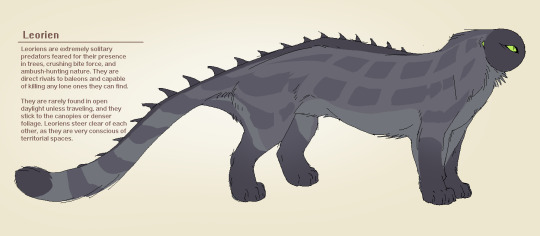
Leorien
Leoriens are extremely solitary predators feared for their presence in trees, crushing bite force, and ambush-hunting nature. They are direct rivals to baleons and capable of killing any lone ones they can find.
They are rarely found in open daylight unless traveling, and they stick to the canopies or denser foliage. Leoriens steer clear of each other, as they are very conscious of territorial spaces.

Bushven
Bushvens are fully-aquatic sentient flora that can be found in swarms.
While feeding, they can appear to the unaware like flowers floating along the surface of the water. This is because they flare the leaves from their bodies and point upward to photosynthesize, only letting their flower-shaped snouts break the surface. They have no mouths.

Mayskit
The mayskits are tiny, photosynthetic tree-dwellers that skitter along branches to evade threats, being one of the fastest terrestrial animals.
They rely on signifying dangers to each other through their antennae. In confrontations, mayskits can whip their lengthy tails with sharp speed.

Alamoth
An alamoth is a rare and devastating sight, being the most significant threat to all other species including their own. If an alamoth spots another of its kind, it will urgently knock it out of the skies or kill it on sight.
Their extra pair of eyes are angled downward to improve their range of vision in flight. While they can use their thick jaws and massive talons, their favored method of hunting is quite literally beating their prey in to the dirt with their wings.
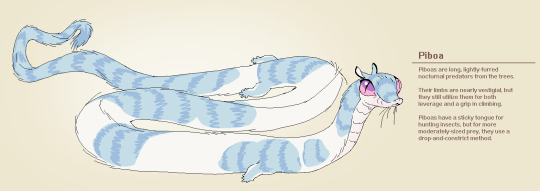
Piboa
Piboas are long, lightly-furred nocturnal predators from the trees.
Their limbs are nearly vestigial, but they still utilize them for both leverage and a grip in climbing.
Piboas have a sticky tongue for hunting insects, but for more moderately-sized prey, they use a drop-and-constrict method.
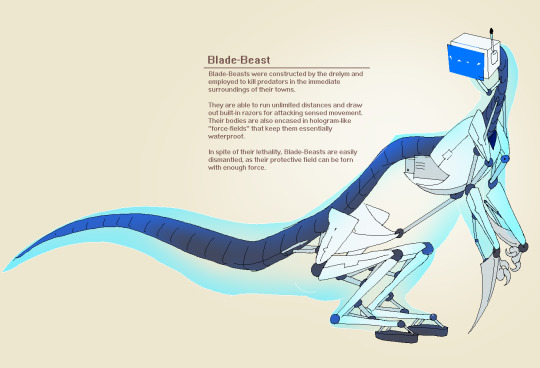
Blade-Beast
Blade-Beasts were constructed by the drelym and employed to kill predators in the immediate surroundings of their towns.
They are able to run unlimited distances and draw out built-in razors for attacking sensed movement. Their bodies are also encased in hologram-like “force-fields” that keep them essentially waterproof.
In spite of their lethality, Blade-Beasts are easily dismantled, as their protective field can be torn with enough force.

Mavie
The mavies are among the largest herbivores. Their necks enable them to reach fruit and leaves from the trees, while their front limbs give them the extra leverage on branches to stand further upright for a better reach.
Their thickly layered fur and sheer force in a stomp makes them an unfavorable target to attackers.
Mavies tend to migrate to less-populated and colder regions for the sake of having offspring.

Tivid
Tivids are small flying omnivores that roost on trees in swarms.
They fly actively at dawn and dusk to search for fruit, insects, larvae, and carcasses.
Their wings each have a single hooked claw for gripping surfaces and reaching in to narrow spaces.
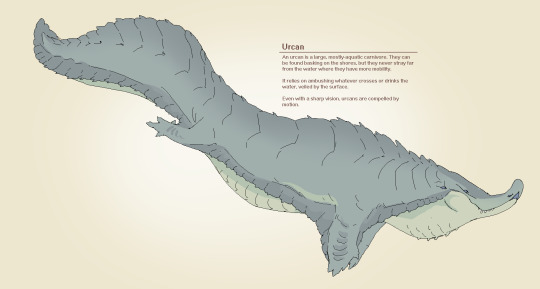
Urcan
An urcan is a large, mostly-aquatic carnivore. They can be found basking on the shores, but they never stray far from the water where they have more mobility.
It relies on ambushing whatever crosses or drinks the water, veiled by the surface.
Even with a sharp vision, urcans are compelled by motion.

Chart in order of silhouettes:
Tivid
Mayskit
Bushven
Teppet
Drelym
Arthrid
Baleon
Leolien
Piboa
Blade-Beast
Urcan
Tervine
Alamoth
Mavie
264 notes
·
View notes
Text

There is the final draft of the robo Kitty. Still have to fully figure out his patterning really. But I just wanted to focus on getting his robotics. Mostly so I had them when I tore him apart. So it is missing some things like the major part of his fire hair and temp patterns. But I just wanted to get his body done.
He is entirely based off of those stage performing giant robots. You can find what I'm mentioning I'm by looking up things like walking with dinosaurs or httyd live spectacular. This one is done on a much much much bigger scale. Plus of course I'm kind of just guessing some of the moving mechanics. Got to add that fnaf 'Guess work engineering' look.
Other than my lack of knowledge on robots. Most of the body is built like an animal. It has plenty of rib like structures that hold up the fiberglass skin. Most of the movable parts of the body are this spine like movement system. The back feet are controlled by a little... I would describe it as those wind up toys and how they move? The front arms are movable though. And it has this giant piston that connects to his chest. This piston's only job is help the creature rear up. The entire thing moves on that little platform with a bunch of wheels.
Like I said I'll have to pattern the guy out soon. But for now this is pretty nice. Below is just The same image except the robot parts are overlaid with the body. At least if you want that interesting visual

2 notes
·
View notes
Text
HOW FIRST CONTACT WITH WHALE CIVILIZATION COULD UNFOLD

In 2020, Gruber founded Project CETI with some of the world’s leading artificial-intelligence researchers, and they have so far raised $33 million for a high-tech effort to learn the whales’ language. Gruber said that they hope to record billions of the animals’ clicking sounds with floating hydrophones, and then to decipher the sounds’ meaning using neural networks. I was immediately intrigued. For years, I had been toiling away on a book about the search for cosmic civilizations with whom we might communicate. This one was right here on Earth.
Sperm whales are the planet’s largest-brained animals, and their nested social structures are immense. About 10 whales swim together full-time as a unit. They will sometimes meet up with others in groups of hundreds. All of the whales in these larger groups belong to clans that can contain as many as 10,000 animals, or perhaps more. (The upper limit is uncertain, because industrial whaling reduced the animals’ numbers.) Sperm whales meet just a fraction of their fellow clan members during their lifetime, but with those they do meet, they use a clan-specific dialect of click sequences called codas.
I recently visited the paleontologist Nick Pyenson in his office at the end of a long corridor of fossils at the Smithsonian Museum of Natural History. As we hefted a sperm whale’s skull out of a fiberglass crate, he told me that the clans likely date back to the Ice Age and that a few could be hundreds of thousands of years old. Their codas could be orders of magnitude more ancient than Sanskrit. We don’t know how much meaning they convey, but we do know that they’ll be very difficult to decode. Project CETI’s scientists will need to observe the whales for years and achieve fundamental breakthroughs in AI. But if they’re successful, humans could be able to initiate a conversation with whales.
—Ross Andersen, in The Atlantic
6 notes
·
View notes
Text
Creating a Timeless Holiday Scene with Large Nativity Sets and Animals
The holiday season brings with it cherished traditions, and one of the most iconic symbols of Christmas is the Nativity scene. Whether you are setting up a display at home, in a church, or as part of a community event, a Large Nativity Set featuring Large Nativity Animals can create an awe-inspiring centerpiece that celebrates the true essence of Christmas. These detailed and beautifully crafted sets not only tell the story of the birth of Jesus but also add a touch of elegance and warmth to your holiday décor.
Why Choose a Large Nativity Set?
A Large Nativity Set offers several advantages over smaller displays. Firstly, its size ensures it stands out, making it perfect for both indoor and outdoor setups. The larger scale allows for intricate detailing in the figures, ensuring every piece, from Mary and Joseph to the shepherds and wise men, is lifelike and visually impactful. Such a set becomes a focal point, drawing the attention of visitors and reminding everyone of the significance of the season.
Moreover, a large set allows for better customization and expansion. You can add additional figures, animals, or props over the years, gradually building a more elaborate and unique display. This flexibility ensures your Nativity scene remains fresh and exciting year after year.
The Role of Large Nativity Animals
Large Nativity Animals play a crucial role in bringing authenticity to the scene. The inclusion of animals such as donkeys, sheep, camels, and even oxen adds depth and realism, transporting viewers to the humble stable where Jesus was born. These animals symbolize simplicity and the connection between humanity and nature, enhancing the spiritual ambiance of your display.
High-quality Large Nativity Animals are often hand-painted and made from durable materials, ensuring they can withstand various weather conditions if used outdoors. Their size and craftsmanship make them not just accessories but integral elements that elevate the overall presentation of the Nativity scene.
Tips for Displaying Your Nativity Scene
Choose the Right Location: Whether indoors or outdoors, ensure your display is placed in a prominent and stable location. For outdoor setups, a sheltered spot can protect the figures from harsh weather.
Lighting Matters: Proper lighting can make your Large Nativity Set shine, literally and figuratively. Use soft, warm lights to highlight key figures and create a serene, welcoming glow.
Add Surrounding Elements: Consider adding elements like straw, wooden structures, or even a backdrop depicting the night sky to make your scene more immersive. These additional details can complement your Large Nativity Animals and figures beautifully.
Secure Your Display: If your Nativity scene is outdoors, ensure all figures and props are securely anchored to prevent them from tipping over due to wind or other factors.
Involve the Community: If your Nativity set is part of a public display, involve your community in setting it up or organizing a lighting ceremony. This not only spreads holiday cheer but also strengthens communal bonds.
Choosing the Perfect Set
When selecting a Large Nativity Set, consider factors like material, craftsmanship, and durability. High-quality sets are often made from resin, fiberglass, or wood, ensuring longevity. Pay attention to the details—well-crafted figures with expressive faces and realistic features make a world of difference in creating an engaging and meaningful display.
It’s also essential to choose a set that fits your space and budget. Many retailers offer individual pieces, allowing you to start with a basic set and expand over time. This approach is both practical and budget-friendly.
The Timeless Appeal of Nativity Scenes
Nativity scenes have been a part of Christmas celebrations for centuries, with their origins tracing back to St. Francis of Assisi in the 13th century. Over time, these displays have evolved in style and scale, but their purpose remains the same: to remind us of the humble beginnings of Jesus Christ and the message of love, hope, and peace that his birth brought to the world.
In today’s fast-paced and often commercialized holiday season, setting up a Nativity scene serves as a grounding tradition. It encourages reflection on the spiritual essence of Christmas and provides an opportunity for families and communities to come together in celebration and gratitude.
Where to Find the Best Large Nativity Sets and Animals
For those looking to invest in a high-quality Large Nativity Set or Large Nativity Animals, online retailers and specialty stores offer a wide range of options. Companies like Tabash Souvenirs provide beautifully crafted pieces that combine artistry with durability, ensuring your Nativity scene remains a cherished part of your holiday traditions for years to come.
Conclusion
A Large Nativity Set, complete with Large Nativity Animals, is more than just a decoration; it’s a powerful symbol of faith and tradition. By choosing a high-quality set and displaying it thoughtfully, you can create a stunning and meaningful centerpiece for your holiday celebrations. Whether you’re starting a new tradition or enhancing an existing one, investing in a Nativity scene is a timeless way to honor the true spirit of Christmas.
0 notes
Text
Guide to Pond Tent Covers: Protecting Your Pond Year-Round
Ponds are beautiful, tranquil additions to any property. They create a natural ecosystem, enhance landscaping, and offer a relaxing retreat. However, maintaining a pond is no easy feat. Debris, predators, and harsh weather conditions can harm your pond and its inhabitants. Enter the pond tent cover—a versatile, effective solution for pond protection.
In this article, we’ll explore everything you need to know about pond tent covers, including their benefits, installation, and a reliable option: the Pond Tent Cover EasyPro.
What is a Pond Tent Cover?
A pond tent cover is a structured netting system designed to safeguard ponds from leaves, debris, and predators while maintaining aesthetic appeal. Unlike traditional netting, these covers feature a tent-like frame that provides elevated protection, preventing sagging into the water and ensuring durability against harsh conditions.
Benefits of Using a Pond Tent Cover
Keeps Debris Out Autumn leaves and other debris can quickly accumulate in ponds, leading to water quality issues and increased maintenance. A pond tent cover acts as a barrier, keeping unwanted materials at bay.
Protects Against Predators Herons, raccoons, and other predators can pose significant threats to fish and other pond inhabitants. Tent covers create a secure shield, deterring these animals effectively.
Minimizes Winter Damage In colder months, ice and snow can strain regular nets or cause them to collapse. Tent covers, with their robust framework, ensure your pond remains protected year-round.
Enhances Safety For households with children or pets, pond tent covers add an extra layer of safety by preventing accidental falls into the water.
Features to Look for in a Pond Tent Cover
When choosing the right pond tent cover, consider the following factors:
Size and Dimensions Ensure the cover fits your pond perfectly. Many covers come in standard sizes, such as the Pond Tent Cover EasyPro, which measures 13 x 17 feet, ideal for medium to large ponds.
Durable Frame Look for materials like fiberglass or heavy-duty steel for longevity and stability.
High-Quality Netting Opt for UV-resistant and fine mesh netting that blocks debris without hindering airflow or sunlight.
Ease of Installation A good pond tent cover should be easy to assemble and dismantle for storage.
How to Install a Pond Tent Cover
Installing a pond tent cover is straightforward. Follow these steps for optimal results:
Prepare the Area Clear any debris or obstacles around your pond to ensure a smooth installation process.
Assemble the Frame Lay out the frame components and follow the manufacturer’s instructions to build the structure.
Position the Tent Cover Place the assembled frame over your pond, ensuring it covers all edges.
Secure the Netting Attach the netting to the frame, ensuring it’s taut and free of gaps.
Anchor the Cover Use stakes or weights to secure the frame to the ground, especially in windy areas.
Why Choose the Pond Tent Cover EasyPro?
The Pond Tent Cover EasyPro is a premium option for pond enthusiasts seeking reliable protection. Here’s why it stands out:
Durable Construction Its heavy-duty frame ensures stability, even in adverse weather conditions.
Fine Mesh Netting The UV-resistant netting effectively blocks debris and predators while allowing sunlight and air circulation.
Generous Dimensions With a size of 13 x 17 feet, this cover accommodates larger ponds effortlessly.
Simple Assembly The EasyPro pond tent cover is user-friendly, requiring minimal tools for setup.
Maintenance Tips for Pond Tent Covers
To maximize the lifespan of your pond tent cover, follow these maintenance tips:
Regular Cleaning Remove accumulated leaves and debris to prevent strain on the netting.
Check for Damage Inspect the frame and netting for wear and tear, replacing any damaged components promptly.
Store Properly During off-seasons, disassemble the cover and store it in a dry, sheltered location.
Final Thoughts
Investing in a pond tent cover is a smart move for pond owners. It keeps your water feature clean, safe, and visually appealing while reducing maintenance efforts. The Pond Tent Cover EasyPro offers an exceptional combination of quality, durability, and convenience, making it a top choice for pond enthusiasts.
0 notes
Text
Inflatable Car Tent: The Ultimate Portable Shelter for Your Vehicle
With the increasing demand for convenience and protection in outdoor adventures, an inflatable car tent has become a game-changer for vehicle owners and outdoor enthusiasts alike. Whether you're a camper, road tripper, or someone who needs a reliable cover for your vehicle, inflatable car tents offer an innovative, portable, and durable solution. In this article, we will explore the benefits, uses, and reasons why an inflatable car tent is the ultimate portable shelter for your vehicle.
1. What Is an Inflatable Car Tent?
An inflatable car tent is a portable, inflatable shelter specifically designed to cover and protect vehicles. Unlike traditional tents or canopies that require poles and extensive setup, inflatable car tents use air-filled beams for support. These structures are made from high-strength, weather-resistant materials that provide protection from the elements, such as rain, snow, hail, and sun. With their lightweight design and ease of setup, inflatable car tents are perfect for outdoor enthusiasts, frequent travelers, or anyone in need of a reliable car shelter.
The tent is inflated using an air pump, and within minutes, you have a full-sized shelter that can comfortably cover your vehicle. Its versatility means that it can be used for cars, SUVs, trucks, or even motorcycles, providing complete coverage and peace of mind.
2. Key Benefits of an Inflatable Car Tent
An inflatable car tent offers several advantages that make it an attractive option for vehicle owners. Below are some of the top benefits:
Quick and Easy Setup: One of the primary advantages of an inflatable car tent is the ease of setup. Traditional car shelters often require poles, ropes, and a lot of effort to assemble. In contrast, an inflatable car tent can be set up in minutes using an air pump, saving you time and energy, especially when you're on the go or dealing with inclement weather.
Portability: Inflatable car tents are designed with portability in mind. They are lightweight and can be deflated and packed into a compact size for easy transport and storage. This makes them ideal for people who travel frequently or enjoy camping and road trips. You can simply deflate the tent, pack it in your trunk, and take it anywhere.
Weather Protection: Protecting your vehicle from harsh weather conditions is a top priority, and inflatable car tents excel in this regard. They provide full coverage, shielding your car from rain, snow, hail, strong winds, and harmful UV rays. The durable, weather-resistant materials ensure that your vehicle remains safe and undamaged, regardless of the outdoor conditions.
Versatility: Inflatable car tents are not limited to just covering your car. Many models are designed with additional space for outdoor activities such as camping, picnicking, or even working outdoors. This added versatility means you can use the inflatable tent as both a vehicle shelter and a temporary outdoor living space, giving you more flexibility during your adventures.
Vehicle Safety: Parking your car outdoors for extended periods can expose it to potential damage from falling debris, tree sap, or even animal droppings. An inflatable car tent offers a protective barrier that helps prevent damage, keeping your car in good condition for longer.
3. How Inflatable Car Tents Work
The working principle of an inflatable car tent is simple and efficient. The tent features inflatable beams that replace the traditional metal or fiberglass poles typically used in other tents. These beams are filled with air using a pump, and once inflated, they provide a rigid structure that can support the tent and withstand various weather conditions.
Once fully inflated, the tent creates a dome-like canopy that completely covers your vehicle, offering protection from all sides. The air-filled beams provide a sturdy framework, while the high-strength fabric ensures durability and resistance to weather elements. Deflating the tent is just as easy as inflating it. You simply release the air, and the tent collapses into a compact size, ready for storage or transport.
4. Popular Uses for Inflatable Car Tents
Inflatable car tents are highly versatile and can be used in a wide range of scenarios. Here are some common uses:
Camping and Road Trips: For outdoor enthusiasts, an inflatable car tent is a must-have accessory. Whether you're camping in the wilderness or going on a road trip, this tent provides a reliable shelter for both you and your vehicle. It not only protects your car from the elements but also offers a shaded area where you can relax, eat, or even sleep.
Outdoor Events: Inflatable car tents are also perfect for outdoor events such as festivals, concerts, and sporting events. They offer a convenient shelter for your vehicle and a comfortable space to hang out, store gear, or take a break from the sun. Their portability makes them ideal for events where you need quick and easy setup.
Vehicle Protection at Home: If you don't have a garage or carport, an inflatable car tent can serve as a temporary shelter for your vehicle in your driveway or yard. It protects your car from the sun, rain, snow, and falling debris, keeping it in top condition even when parked outside.
Work and Recreation: An inflatable car tent can also be used as a shaded workspace for outdoor projects or recreational activities. Whether you're doing maintenance on your vehicle, organizing a tailgate, or enjoying a picnic, the inflatable tent provides a comfortable, protected area.
0 notes
Text
Tuesday, August 26 - Vonavona, Solomon Islands










We had signed up for a kayak trip today on both the advice of one of our kayak guides and because I had read in a blog about where they might go. We started out with a Zodiac launch into the kayaks - typical of colder weather excursions - and paddled across fairly choppy water to the lee of several small islands. Here we had to get out and drag our boats over very shallow older dead coral to a tiny beach. From the water we could see a small derelict picket fence. This was "Skull Island", and it was worth the trip.
We had a moment of silence on the beach, since this is a sacred place to the locals, and usually we would have been greeted by a local, but today we were by ourselves. Towards the center of this very small island are a couple of stone mounds. One has several standing stones embedded in the stone pile, while the other has many little stone niches holding one to three human skulls each. These are the skulls of ancestors and fallen warriors, and a small triangular structure covers a chieftain's skull and clam-shell artifacts. The skulls supposedly range in age from around WWI to back hundreds of years.
While some skulls were visible on all sides of the mound, it is likely there are more further down in the pile. At one time there were many of these places throughout the Solomon Islands, dating back to the days of the headhunters, but missionaries frowned on the practice of ancestors worship, and destroyed many, resulting in some skulls being moved to this location. Strangely, there is also an area some 50 yards away with a couple of stones crosses, but there is no information about them. It is a very peaceful spot, and an indication that the old ways have not been completely forgotten.
From here we got back in our kayaks and paddled along the shores of a slightly larger island, watching as bigger fish scared up schools of tiny fish, who surfaced as one large shimmering mass of almost indistinguishable individual parts. Occasionally a flying fish would also be startled and sail for yards before landing back in the sea. The water was incredibly clear and we could see sea stars, fish and corals right beneath our boats.
After we beached the kayaks on another beach, we headed towards deeper water on the Zodiac and jumped in the water for a cooling swim before heading back to the ship. We had just enough time to quickly change and get on another Zodiac for about a 30 minute ride to an inhabited island in the opposite direction from the kayaking. Part of the reason it took so long to get back to shore is that since this whole area is a giant atoll, there were some very shallow coral reefs that needed to be navigated. No props were lost, but at least one boat hit bottom at least once.
On shore we were treated to still another cultural presentation - this one consisting of a series of dances by a group of men. The dances were not as warlike as some we had seen previously, but centered more on animals, from a snake dance to another depicting frogs and rats, complete with jumping mimicking the frog's movements. The locals had also brought beautiful carvings with mother-of-pearl inlays depicting every thing from masks to canoes to even snorkel fins. They were beautiful, and fairly pricey, reflecting the enormous amount of work that went into them. It does make me wonder how much traffic they get through here to allow them to sell their goods. Naturally, like every where we have been so far, there were also polished shells for sale, which we are not allowed to bring back.
Since this area was not really a village, but a privately owned island, most of the vendors and dancers had come by boat - some canoes, but mostly fiberglass boats with outboards. After the dancers had finished, most of them changed into modern clothes and played a game of beach soccer - it was fun to watch them become "modern" before our eyes.
We headed back then to the ship for a late lunch and set sail for Alotau (once again) to clear customs and immigration into PNG with our new people aboard. We will not be leaving the boat this time, as will get in tomorrow evening and the customs folks will do their thing on board at that time. So tomorrow will be another sea day, which isn't all that bad, as we have plenty of talks and activities to look forward to.
0 notes
Text
Attic Insulation Removal
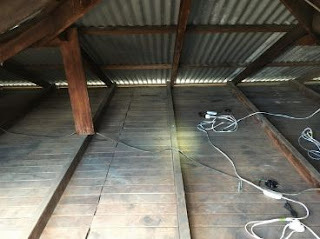
The thought of performing Attic Insulation Removal or Attic Cleaning in your own Attic can be daunting. Most homeowners have never seen what their attic looks like let alone have they spent any significant amount of time in their dark, cramped attic above the ceiling. We’ll start with the basics. Your attic is not built for anyone to safely occupy without knowing how tos move around. and foremost, you must walk along the floor joists - insulation brisbane.
We cover all surfaces along the pathway to the attic entrance in an effort to reduce back mud exiting the workspace. Depending on the sort of insulation or harm, removal can be done by machine or by hand. However, bagging insulation and removing it by hand is more time-intensive, and thus dearer. Animal urine and droppings create a toxic environment that can impression your house's air quality over time as well as break down each insulation and structural material. A radiant barrier consists of tremendous reflective sheeting materials that reflect warmth and lower your HVAC prices and overall energy bill. In the winter, it works to keep warmth in your house by preventing heat loss via your roof - brisbane insulation.
We manually take away the batt insulation in a manner that minimizes potential health dangers and dirt issues. And in the summertime, it prevents heat transfer through the rooftop, which may make your own home sizzling. We take away batt insulation in your attic by placing it in special trash baggage that are out there to insulation contractor groups. Blown-in insulation is eliminated with the utilization of a big industrial vacuum, so you’ll positively desire a skilled to take away it. There are many kinds of insulation, depending in your needs. With the proper gear, professional attic insulation elimination can take a few hours. The first step in attic insulation removal is to follow security precautions similar to wearing gloves and a mask for defense from cellulose dust coats.
The Attic Insulation Removal equipment and supplies needed for your project will be determined by the type of insulation to be removed. You will have one of two types of insulation in your attic, sometimes both; your attic will have been previously insulated with Blown Cellulose Insulation or Fiberglass Batt Insulation. For more information, please visit our site https://roofsuckers.com.au/
0 notes
Text
FRP Sheets in Karnataka
Fiberglass Reinforced Plastic (FRP) sheets have revolutionized the roofing industry with their durability, versatility, and cost-effectiveness. In the vibrant state of Karnataka, where rapid urbanization and industrial growth are reshaping landscapes, the demand for reliable roofing solutions is higher than ever.
FRP sheets have emerged as a preferred choice for builders, architects, and homeowners alike due to their numerous advantages. In this article, we delve into the world of FRP sheet in Karnataka, exploring their applications, benefits, and the leading provider, RoofMyWorld, dedicated to delivering top-notch FRP roofing solutions.
Understanding FRP Sheets in Karnataka:
FRP sheets are composite materials made of fiberglass reinforced with plastic resin, offering exceptional strength, flexibility, and weather resistance. In Karnataka, a state known for its diverse climatic conditions ranging from coastal regions to hilly terrains, the need for robust roofing solutions is evident.
FRP sheets in Karnataka cater to this demand by providing reliable protection against harsh sunlight, heavy rains, and high winds, making them ideal for both residential and industrial applications.
Applications of FRP Sheets in Karnataka:
Industrial Roofing: Karnataka boasts a thriving industrial sector, encompassing manufacturing units, warehouses, and commercial complexes. FRP roofing sheets in Karnataka are extensively used in industrial settings due to their ability to withstand corrosive chemicals, UV radiation, and extreme temperatures. They provide long-lasting protection, ensuring the safety of assets and personnel while minimizing maintenance costs.
Agricultural Structures: Agriculture forms the backbone of Karnataka's economy, with vast expanses of farmland spread across the state. FRP sheets find widespread use in agricultural structures such as greenhouses, poultry sheds, and livestock shelters. Their lightweight nature, coupled with excellent light transmission properties, creates an optimal environment for crop cultivation and animal husbandry, leading to higher yields and profits.
Residential Roofing: In urban and rural areas alike, FRP roofing sheet in karnataka are gaining popularity for residential roofing applications. Whether it's individual homes, apartment complexes, or low-cost housing projects, FRP sheets offer an affordable yet durable roofing solution. Homeowners appreciate their low maintenance requirements, aesthetic appeal, and ability to withstand the rigors of Karnataka's climatic conditions.
Benefits of FRP Roofing Sheets in Karnataka:
Durability: FRP sheets are known for their exceptional durability, making them a preferred choice for roofing applications in Karnataka. They are resistant to corrosion, rust, and decay, ensuring longevity even in challenging environments. This durability translates to cost savings over the lifespan of the roofing system, making it a financially prudent investment.
Weather Resistance: Karnataka experiences diverse weather patterns, including heavy rainfall during monsoons and scorching heat during summers. FRP roofing sheets in karnataka are engineered to withstand such extremes, offering superior resistance to UV radiation, moisture, and thermal expansion. This weather resilience ensures reliable protection for structures and occupants, even in the harshest conditions.
Lightweight Construction: One of the key advantages of FRP roofing sheets is their lightweight nature, which simplifies installation and reduces structural load. This makes them particularly suitable for retrofitting existing structures or constructing new buildings where weight considerations are paramount. Additionally, the ease of handling and transportation contributes to faster project completion times, minimizing labor costs.
RoofMyWorld: Your Trusted Partner for FRP Roofing Solutions in Karnataka
In the realm of FRP roofing sheet in Karnataka, RoofMyWorld stands out as a leading provider committed to excellence, innovation, and customer satisfaction. With years of experience and a proven track record, RoofMyWorld offers a comprehensive range of FRP roofing solutions tailored to meet the diverse needs of clients across Karnataka. Here's why RoofMyWorld is the preferred choice:
High-Quality Products: RoofMyWorld sources premium-grade materials and employs state-of-the-art manufacturing processes to produce FRP roofing sheets of unmatched quality. Each product undergoes rigorous quality control measures to ensure durability, reliability, and performance excellence.
Customized Solutions: RoofMyWorld understands that every project is unique, with its own set of requirements and challenges. That's why they offer customized FRP roofing solutions tailored to meet specific design specifications, budget constraints, and performance criteria. Whether it's a small-scale residential project or a large-scale industrial complex, RoofMyWorld has the expertise to deliver tailored solutions that exceed expectations.
Technical Expertise: With a team of skilled engineers, technicians, and support staff, RoofMyWorld provides comprehensive technical support throughout the project lifecycle. From initial consultation and design assistance to on-site installation supervision and after-sales service, RoofMyWorld ensures seamless execution and customer satisfaction at every step.
Conclusion:
In Karnataka, where the demand for reliable roofing solutions is on the rise, FRP sheets have emerged as a versatile and cost-effective choice for a wide range of applications.
Whether it's industrial, agricultural, or residential roofing, FRP sheet in karnataka offer unmatched durability, weather resistance, and ease of installation, making them the preferred choice for builders, architects, and homeowners alike. With RoofMyWorld as your trusted partner, you can rest assured of top-quality FRP roofing solutions tailored to meet your specific needs and exceed your expectations. Experience the difference with RoofMyWorld and elevate your roofing experience to new heights.
0 notes
Text
Plastic earthing pit cover supplier
An earthing pit lid is placed on top of the earthing pit and is referred to as an earthing chamber cover or plastic earthing pit cover. Earthing pits are holes excavated in the ground and filled with conductive materials, like crushed stone or charcoal. After that, a building or other structure’s electrical system is linked to the earthing pit. By dissipating lightning strikes and electrical fault currents, this link can help keep people and equipment safe.
Fiberglass reinforced plastic (FRP) or high-density polyethylene (HDPE) are the most common materials used to make plastic earthing pit coverings. UV and corrosion resistance abound in HDPE, making it an incredibly strong and resilient plastic. Fiberglass and resin are combined to create the composite material known as FRP.
Additionally robust and long-lasting, fiber-reinforced polymer (FRP) is non-conductive, a crucial safety characteristic for earthing pit covers.
Earthing pit coverings made of plastic have several uses. They first assist in maintaining the earthing pit tidy and debris-free. Debris can insulate the earthing pit and lessen its efficiency, which is why this is crucial. Second, earthing pit coverings made of plastic aid in preventing animals and humans from falling into the pit. Thirdly, weather-related and vandal damage to the earthing system can be mitigated by the installation of plastic earthing pit covers.
The following are some advantages of employing earthing pit covers made of plastic:
Durability: Earthing pit covers made of plastic are composed of strong, long-lasting materials that can resist severe weather.
Corrosion resistance: Because plastic is not prone to corrosion, earthing pit covers won’t corrode or break down over time. UV resistance: Both FRP and HDPE are able to withstand the effects of sunshine without fading or cracking. Non-conductivity: One crucial safety aspect for earthing pit covers is the non-conductive nature of FRP. Simple to install: Earthing pit covers made of plastic are lightweight and simple to install. Minimal upkeep: Earthing pit covers made of plastic need little upkeep.
0 notes
Text
FRP Sheets in Karnataka
Introduction:
Fiberglass Reinforced Plastic (FRP) sheets have revolutionized the roofing industry with their durability, versatility, and cost-effectiveness. In the vibrant state of Karnataka, where rapid urbanization and industrial growth are reshaping landscapes, the demand for reliable roofing solutions is higher than ever.
FRP sheets have emerged as a preferred choice for builders, architects, and homeowners alike due to their numerous advantages. In this article, we delve into the world of FRP sheet in Karnataka, exploring their applications, benefits, and the leading provider, RoofMyWorld, dedicated to delivering top-notch FRP roofing solutions.
Understanding FRP Sheets in Karnataka:
FRP sheets are composite materials made of fiberglass reinforced with plastic resin, offering exceptional strength, flexibility, and weather resistance. In Karnataka, a state known for its diverse climatic conditions ranging from coastal regions to hilly terrains, the need for robust roofing solutions is evident.
FRP sheets in Karnataka cater to this demand by providing reliable protection against harsh sunlight, heavy rains, and high winds, making them ideal for both residential and industrial applications.
Applications of FRP Sheets in Karnataka:
Industrial Roofing: Karnataka boasts a thriving industrial sector, encompassing manufacturing units, warehouses, and commercial complexes. FRP roofing sheets in Karnataka are extensively used in industrial settings due to their ability to withstand corrosive chemicals, UV radiation, and extreme temperatures. They provide long-lasting protection, ensuring the safety of assets and personnel while minimizing maintenance costs.
Agricultural Structures: Agriculture forms the backbone of Karnataka's economy, with vast expanses of farmland spread across the state. FRP sheets find widespread use in agricultural structures such as greenhouses, poultry sheds, and livestock shelters. Their lightweight nature, coupled with excellent light transmission properties, creates an optimal environment for crop cultivation and animal husbandry, leading to higher yields and profits.
Residential Roofing: In urban and rural areas alike, FRP roofing sheet in karnataka are gaining popularity for residential roofing applications. Whether it's individual homes, apartment complexes, or low-cost housing projects, FRP sheets offer an affordable yet durable roofing solution. Homeowners appreciate their low maintenance requirements, aesthetic appeal, and ability to withstand the rigors of Karnataka's climatic conditions.
Benefits of FRP Roofing Sheets in Karnataka:
Durability: FRP sheets are known for their exceptional durability, making them a preferred choice for roofing applications in Karnataka. They are resistant to corrosion, rust, and decay, ensuring longevity even in challenging environments. This durability translates to cost savings over the lifespan of the roofing system, making it a financially prudent investment.
Weather Resistance: Karnataka experiences diverse weather patterns, including heavy rainfall during monsoons and scorching heat during summers. FRP roofing sheets in karnataka are engineered to withstand such extremes, offering superior resistance to UV radiation, moisture, and thermal expansion. This weather resilience ensures reliable protection for structures and occupants, even in the harshest conditions.
Lightweight Construction: One of the key advantages of FRP roofing sheets is their lightweight nature, which simplifies installation and reduces structural load. This makes them particularly suitable for retrofitting existing structures or constructing new buildings where weight considerations are paramount. Additionally, the ease of handling and transportation contributes to faster project completion times, minimizing labor costs.
RoofMyWorld: Your Trusted Partner for FRP Roofing Solutions in Karnataka
In the realm of FRP roofing sheet in Karnataka, RoofMyWorld stands out as a leading provider committed to excellence, innovation, and customer satisfaction. With years of experience and a proven track record, RoofMyWorld offers a comprehensive range of FRP roofing solutions tailored to meet the diverse needs of clients across Karnataka. Here's why RoofMyWorld is the preferred choice:
High-Quality Products: RoofMyWorld sources premium-grade materials and employs state-of-the-art manufacturing processes to produce FRP roofing sheets of unmatched quality. Each product undergoes rigorous quality control measures to ensure durability, reliability, and performance excellence.
Customized Solutions: RoofMyWorld understands that every project is unique, with its own set of requirements and challenges. That's why they offer customized FRP roofing solutions tailored to meet specific design specifications, budget constraints, and performance criteria. Whether it's a small-scale residential project or a large-scale industrial complex, RoofMyWorld has the expertise to deliver tailored solutions that exceed expectations.
Technical Expertise: With a team of skilled engineers, technicians, and support staff, RoofMyWorld provides comprehensive technical support throughout the project lifecycle. From initial consultation and design assistance to on-site installation supervision and after-sales service, RoofMyWorld ensures seamless execution and customer satisfaction at every step.
Conclusion:
In Karnataka, where the demand for reliable roofing solutions is on the rise, FRP sheets have emerged as a versatile and cost-effective choice for a wide range of applications.
Whether it's industrial, agricultural, or residential roofing, FRP sheet in karnataka offer unmatched durability, weather resistance, and ease of installation, making them the preferred choice for builders, architects, and homeowners alike. With RoofMyWorld as your trusted partner, you can rest assured of top-quality FRP roofing solutions tailored to meet your specific needs and exceed your expectations. Experience the difference with RoofMyWorld and elevate your roofing experience to new heights.
0 notes
Text
Mesh Panels 101: Your Ultimate Introduction to Types and Materials
Whether you're a DIY enthusiast or a professional contractor, understanding the world of Buy Silver Wire Mesh Panels Online is essential. These versatile panels have a wide range of applications, from fencing to construction and even arts and crafts.
In this article, we'll provide you with a comprehensive guide to different types and materials of mesh panel, giving you the knowledge you need to make informed decisions for your projects. So let's dive in and explore the wonderful world of mesh panels!
What are Mesh Panels?
Mesh panels are sheets made up of interwoven wires or rods, forming a grid-like pattern with uniform gaps known as mesh. These panels can be made from various materials, including metal, plastic, or fibreglass. The size of the mesh can vary, allowing for different levels of visibility, airflow, and security. They provide structural support while also offering a multitude of functional and aesthetic advantages.
Types of Mesh Panels
Welded Wire Mesh Panels
Welded wire mesh panels are made by welding together the intersecting wire junctions. This type of mesh panel offers excellent strength and rigidity, making it suitable for applications that require structural integrity, such as fencing, animal enclosures, and partition walls. Welded wire mesh panels are available in various sizes and wire thicknesses to accommodate different needs.

Woven Mesh Panels
Woven mesh panels are created by weaving individual wires over and under each other to form intricate patterns. This type of mesh panel is known for its flexibility and versatility. Woven mesh panels are commonly used in insect screens, window guards, and decorative applications such as artwork and jewellery. They can be made from different materials, including stainless steel, aluminium, and copper, offering different levels of durability and aesthetic appeal.
Expanded Metal Mesh Panels
Expanded metal mesh panels are made by simultaneously cutting and stretching a sheet of metal, creating a diamond-shaped pattern with uniform openings. This unique design provides strength and rigidity while allowing for excellent airflow and visibility. Expanded metal mesh panels are often used in architectural projects, industrial walkways, and fencing where both security and ventilation are important.
Perforated Metal Mesh Panels
Perforated metal mesh panels are created by punching or drilling holes into a sheet of metal, forming a pattern of evenly spaced openings. This type of mesh panel offers a balance of strength, visibility, and airflow. Perforated metal mesh panels are commonly used in facades, sunscreens, soundproofing panels, and automotive applications. They come in a variety of hole shapes and sizes, allowing for different aesthetic and functional purposes.
Materials for Mesh Panels
Metal Mesh Panels
Metal mesh panels, typically made of steel or aluminium, are renowned for their strength and durability. Steel mesh panels are ideal for heavy-duty applications that require superior strength and security, while aluminium mesh panels offer lightweight construction and corrosion resistance. Both options are available in various finishes, such as galvanised or coated, for enhanced protection against the elements.
Plastic Mesh Panels
Plastic mesh panels, made from materials like high-density polyethene (HDPE), are lightweight, cost-effective, and resistant to rust and corrosion. They are commonly used in garden fencing, plant support, and erosion control. Plastic mesh panels are available in various colours and mesh sizes, allowing for both functional and decorative applications.
Fiberglass Mesh Panels
Fibreglass mesh panels are constructed using woven fibreglass strands coated with PVC. They are highly resistant to corrosion, chemicals, and UV radiation, making them ideal for outdoor applications. Fibreglass mesh panels are commonly used in window and door screens, as well as in construction to provide reinforcement for stucco and plaster.
Conclusion
Understanding the different types and materials of mesh panels is key to selecting the right option for your project. Whether you need strength and security or flexibility and aesthetics, there is a mesh panel to suit your needs. Consider factors such as application, durability, visibility, and airflow requirements to make an informed decision. Now that you're armed with knowledge go ahead and explore the world of mesh panels with confidence. Happy building, crafting, and creating!
0 notes
Text
Insulation Vacuum at the Best Level of Expertise
Warmth is something worth being thankful for, correct? It's a particularly good thing amid solidifying winters, windy days or stormy climates. It therefore follows that insulation is something worth being thankful for, as well. All things considered, protected houses and buildings offer cozy, warm spaces, as well as have healthier, cleaner, more soundproofed airs. Additionally, having insulation holds fast to building codes. Why then, would anybody even consider insulation removal with an insulation removal vac?
Why must a man spend on taking out something that must be a gainful part of the office or home?
Here's the reason. It's actual that insulation is great; with the best possible materials and establishment, it must keep going quite a while. Now and again be that as it may, removal is important. The explanations behind insulation removal for the most part are: health risks damaged or infected insulation, dangers with wiring, over insulation, inefficient insulation, insurance issues, upgrades and renovations.
Insulation, particularly in regions, for example, attics and cellars that has been subjected to steady leaks might be damaged after a timeframe. This expands odds of mildew and mold formation that may spread to different parts of the building. Little animals, for example, squirrels, mice and bats may likewise discover their way into damaged insulation, contaminating the material and also creating damage by scratching and nibbling. These joined heighten the risks for disease among the general population inside, hence the requirement for vacuum for insulation removal.
Over insulation happens when the proprietors or builders got a bit too diverted amid establishment, setting as well thick layers that tamper with indoor ventilation. This in itself is inefficient insulation, as massive materials likewise make undesirable air pockets that negate the purpose of an airtight building. There are cases also while protecting material interacts with down lights or electrical wires. At the point when this happens, there are expanded fire risks.
Insulation removal is further expected to ensure proprietors' insurance. Insurance companies don't for the most part pay out for ceiling collapses that haven't been tampered by outside forces. This implies carelessness on the maintenance of the structure. Obviously, removal is likewise done amid renovations and when a proprietor simply needs to redesign the protecting system to a superior one.
There are a few companies or agencies that offer insulation removal vacuum. This job regularly requires proficient services, as insulation removal is neither a simple nor a safe DIY task. There are chances that a man may get sullied by whatever is inside the old insulation, or manage to have everything collapse all of a sudden.
Companies utilize powerful vacuums and other gear not only for removal, but rather to clean the vacant space also. They try to transport and dispose of the grimy, old material in a way that won't imperil anyone. These insulation removal companies are equipped for taking out any kind of protecting material utilized, from fiberglass sheets to sprayed-on foam.
About us:- Protection from anything that might be a peril to life and limb must dependably start things out. So for those with flawed insulation in their buildings or homes, have it checked and if recommended, motivate somebody to perform insulation removal. Along these lines, everything and everybody keeps on getting a charge out of a healthy, comfortable environment.
0 notes
Text
Harnessing Sustainable Energy at Home: The Rise of Portable Biogas Plant For Home

Understanding Biogas
Biogas is a renewable energy source produced through the breakdown of organic waste in the absence of oxygen. This process, known as anaerobic digestion, occurs naturally in landfills, marshes, and even animal digestive systems. Biogas consists primarily of methane (CH4), carbon dioxide (CO2), and small amounts of other gases.
Components of a Portable Biogas Plant
A portable biogas plant typically consists of the following components:
Digester: This is the main unit where the anaerobic digestion process takes place. It is usually a sealed container made of high-density polyethylene (HDPE) or fiberglass reinforced plastic (FRP). The digester holds the organic waste and provides an oxygen-free environment for the production of biogas.
Inlet and Outlet: The digester has an inlet through which the organic waste is added, and an outlet for the discharge of the digested slurry, which can be used as an organic fertilizer.
Gas Holder: The gas holder is a floating dome or balloon-like structure that captures and stores the biogas produced during the digestion process. As biogas is generated, it displaces the liquid in the digester and rises into the gas holder.
Piping System: The piping system connects the gas holder to a stove or other appliances, allowing the biogas to be utilized for cooking, heating, or even generating electricity.
Working Principle
The portable biogas plant follows a simple working principle:
Feedstock Input: Organic waste such as kitchen scraps, agricultural residue, animal manure, or sewage is added to the digester through the inlet. The waste is mixed with water in a specific ratio to create a slurry.
Anaerobic Digestion: The slurry undergoes anaerobic digestion in the digester, facilitated by microorganisms. These microorganisms break down the organic matter, producing biogas as a byproduct.
Gas Storage: As biogas is generated, it displaces the liquid in the digester and rises into the gas holder. The gas holder acts as a storage unit, ensuring a continuous supply of biogas even when the digester is being fed with new waste.
Utilization: The biogas can be extracted from the gas holder and piped to a stove or other appliances for cooking or heating purposes. It can also be used in generators to produce electricity.
Benefits of Portable Biogas Plants for Home Use
Renewable Energy: Portable biogas plants provide a renewable energy source that reduces dependence on fossil fuels and contributes to a cleaner environment.
Waste Management: Organic waste, which would otherwise contribute to landfills or release harmful greenhouse gases, is converted into biogas and valuable organic fertilizer through the digestion process.
Cost Savings: Using biogas for cooking or heating can lead to significant savings in fuel costs over time, particularly in regions where traditional fuels like LPG or firewood are expensive.
Independence: By generating their own biogas, homeowners become self-sufficient in terms of energy production, reducing their reliance on centralized power grids.
0 notes